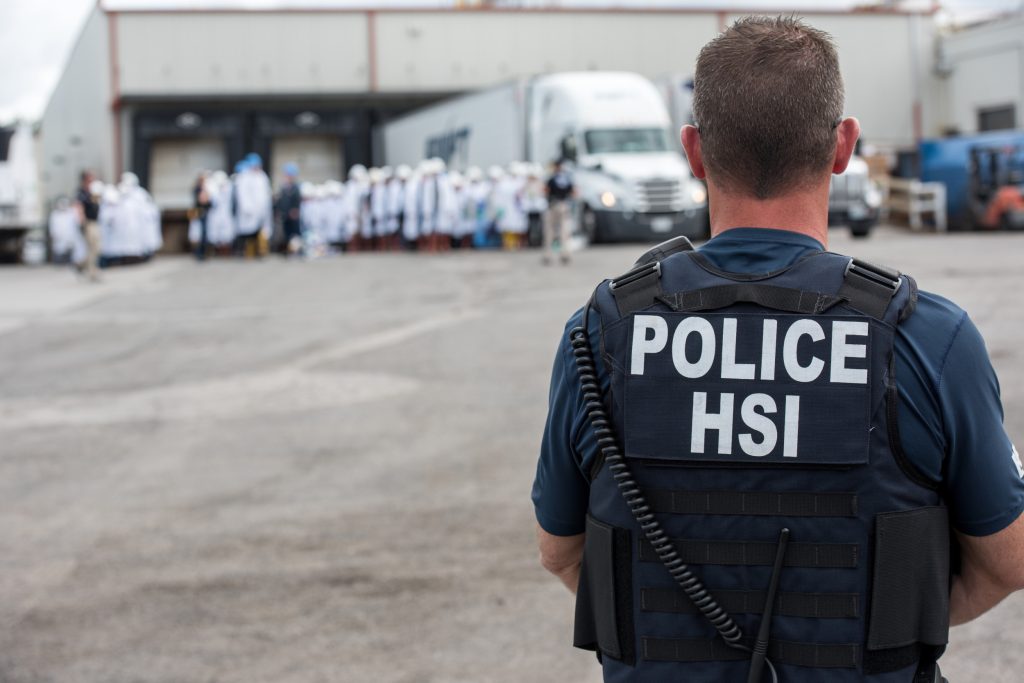The Immigration and Customs Enforcement (ICE) agency, under the direction of the Trump administration, has significantly escalated immigration enforcement actions across the United States, resulting in nearly 1,000 arrests of undocumented immigrants in a single Sunday. This surge in operations aligns with President Trump’s campaign promise to implement the “largest deportation program” in U.S. history, a pledge he has swiftly acted upon through a series of executive orders reinforcing a hard-line stance on immigration. The administration’s actions reflect a broader public sentiment, as a recent New York Times/Ipsos poll indicated majority support for stricter immigration enforcement, particularly among those who favor deporting immigrants with criminal records. This widespread concern over immigration enforcement transcends party lines, with both Democrats and Republicans expressing dissatisfaction with the current system.
The recent ICE operations extend across multiple cities nationwide, including Chicago, a focal point of the intensified enforcement efforts. Senior Trump administration officials, including “border czar” Tom Homan, visited Chicago to oversee the launch of these heightened operations, signaling the administration’s commitment to prioritizing immigration enforcement. Other cities impacted by these raids include Newark, Atlanta, Phoenix, Omaha, Detroit, Miami, Austin, San Antonio, Los Angeles, San Jose, and Denver. The operations involve coordinated efforts between various federal agencies, including ICE, the Drug Enforcement Administration (DEA), Homeland Security, and the Bureau of Alcohol, Tobacco, Firearms and Explosives (ATF), often in conjunction with local law enforcement.
One notable operation took place in Denver, where a pre-dawn raid on a “makeshift nightclub” resulted in the arrest of nearly 50 individuals suspected of being in the country unlawfully. The operation, a collaborative effort between multiple federal and local agencies, also yielded seizures of drugs, weapons, and cash. A significant number of those detained were reportedly linked to the Venezuelan gang Tren de Aragua, highlighting the intersection of immigration enforcement and criminal activity. This raid demonstrates the administration’s focus on targeting individuals deemed threats to public safety.
The ICE field office in Miami also reported several arrests, including individuals apprehended in Florida and Puerto Rico. Charges against those arrested ranged from domestic violence and driving under the influence to aggravated assault with a deadly weapon and possession of controlled substances. These individual cases illustrate the diverse backgrounds and alleged offenses of those targeted in the recent ICE operations, extending beyond immigration violations to encompass various criminal charges.
The Chicago operations garnered significant media attention due to the presence of television personality Dr. Phil, who accompanied ICE agents and DEA officers during the raids. His involvement, which included questioning a detained migrant, generated controversy and raised questions about the role of media personalities in law enforcement activities. The migrant denied being a sex offender and stated that his mother was a U.S. citizen, although he was not.
Tom Homan, a key figure in the Trump administration’s immigration policy, defended the operations, asserting that a majority of those arrested were criminals, while others were either fugitives with deportation orders or individuals apprehended as “collaterals” in sanctuary cities. Homan’s statements emphasize the administration’s focus on public safety threats and its stance on sanctuary cities, which limit cooperation with federal immigration enforcement. Local officials, such as Chicago Mayor Brandon Johnson, clarified that Chicago police were not involved in the ICE operations, highlighting the sometimes-complex relationship between local and federal law enforcement in immigration matters.
These intensified ICE operations mark a significant shift in immigration enforcement under the Trump administration, signaling a commitment to a more aggressive approach to deportations. The administration’s actions have sparked both support and criticism, reflecting the deep divisions within the country over immigration policy. The coordinated raids, often involving multiple federal agencies and local partners, underscore the administration’s determination to prioritize immigration enforcement and target individuals deemed threats to public safety. As the administration continues to implement its immigration agenda, further operations and arrests are anticipated nationwide, potentially leading to legal challenges and further debate over the direction of immigration policy. The future of immigration enforcement under the Trump administration promises to be a contentious and closely watched issue.










